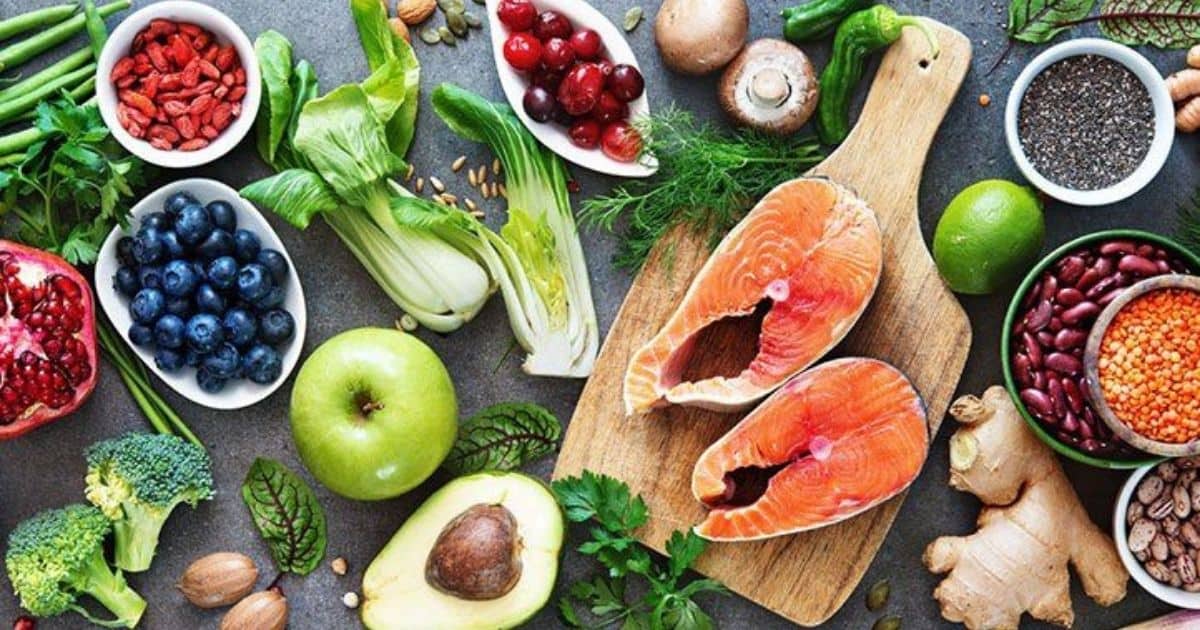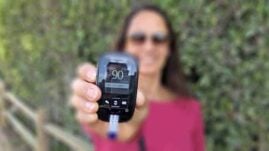“What can I eat?” That’s one of the most common questions that people with type 2 diabetes ask, especially when they’re first diagnosed with this condition.
Knowing what to eat if you have diabetes can seem overwhelming, in part, because there is an abundance of information out there — so much so that you can easily go down a rabbit hole trying to figure out the “best” way to eat.
A lot of the information that you may come across is anecdotal, as well; it may work for one person or a particular group of people, but it may not be appropriate or even safe for you.
This article explores various popular diets geared for people with type 2 diabetes, including the pros and cons of each, and helps you determine the right eating plan for you.

Key facts
- There is no one diet for people with type 2 diabetes; however, some degree of carbohydrate (carb) restriction and consistent carbohydrate intake throughout the day is likely needed to help manage blood sugars.
- Completely avoiding carbohydrates is not practical for people with diabetes, nor is it recommended by diabetes experts. The goal is to choose minimally processed and whole-grain carbohydrate foods while pairing them with fiber and protein.
- The Mediterranean, DASH, and flexitarian eating plans may be suitable for some people with type 2 diabetes, as they focus on foods from all food groups, and are less likely to cause side effects.
- Ketogenic and other low-carb eating plans can also be good options for some people with type 2 diabetes. However, they are more restrictive, have potential side effects, and may be harder to follow long-term.
- The best diet for managing type 2 diabetes is one that is safe, effective, and sustainable, considering personal preferences and lifestyle.
- Support and guidance from your healthcare team, family, and friends can help you decide on the best eating plan for you.
What role does diet play in managing type 2 diabetes?
Type 2 diabetes is a condition in which the cells in the body don’t use insulin properly. For some people, type 2 diabetes can also mean that the pancreas isn’t making enough insulin to keep blood sugars in a normal range.
Many people with type 2 diabetes can manage their condition with a healthy eating plan and regular physical activity; others may also need to take oral or injectable medicines, including insulin, to help manage blood sugars and avoid complications.
A healthy eating plan is a cornerstone of diabetes management, whether you take medicines or not.
Why should people with diabetes control their carbohydrate intake?
Carbohydrate is one of three essential nutrients and serves as the body’s main source of fuel to support bodily functions and physical activity. The other two nutrients, protein and fat, also provide energy, but that’s not their primary role.
The three main types of carbohydrates in the diet are:
- Starches: Found in bread, cereal, pasta, rice, potatoes, corn, tortillas, etc.
- Sugars: Found in fruits, vegetables, milk, table sugar, honey, molasses, etc.
- Fiber: Found in whole grains, beans, vegetables, fruits, nuts, seeds, etc.
When you eat or drink foods that have carbohydrates, your body digests that carb into glucose. Glucose then enters the bloodstream. Glucose levels become too high in people who have diabetes, a condition called hyperglycemia.
Constant hyperglycemia can lead to long-term health problems, such as heart disease, kidney disease, nerve damage, and vision loss.
The goal for people with diabetes is to choose healthier sources of carbs, rather than avoiding carbs altogether. That means eating more of the unprocessed or minimally processed whole grains, beans, fruits, and vegetables, and less of the refined, highly processed carbs such as white bread, white rice, sweetened cereals, juice, and sugary soft drinks.
Refined carb foods have little or no fiber, are digested more quickly, and are more likely to cause blood sugar levels that “spike,” or rise quickly after eating them.
No more “diabetic diets”
If you’ve had diabetes for a long time, you may recall being given a 1200-, 1500-, or 1800-calorie “diabetic diet” to follow. Chances are, you followed it for a very short time, if at all.
Fortunately, the days of diabetic diets are in the past. After all, an 1800-calorie diabetic diet is unrealistic and unsuitable for the wide diversity of people affected by diabetes in terms of cultural backgrounds, personal preferences, socioeconomic settings, and other health conditions.
In addition, research has found that “there is no ideal mix that applies broadly and that macronutrient proportions should be individualized,” according to the Nutrition Therapy for Adults With Diabetes or Prediabetes: A Consensus Report from the American Diabetes Association (ADA).
There is also no ideal percentage of calories from carbohydrates, protein, and fat for all people with type 2 diabetes. In short, there is no “one-size-fits-all” diet or eating plan for managing type 2 diabetes.
Ideally, eating plans or patterns are individualized to the person based on food preferences, cultural and lifestyle factors, and other health issues. A registered dietitian nutritionist (RDN) with expertise in diabetes-focused medical nutrition therapy (MNT) can help tailor an eating plan that is best suited to you.
What are some of the healthiest diets for people with type 2 diabetes?
There are many different diets geared towards people with diabetes. Not surprisingly, some are better than others in terms of effectiveness, nutrition, and sustainability.
Each year, U.S. News & World Report ranks the best diets for the year, including those for diabetes. The Mediterranean diet, DASH diet, and flexitarian diet consistently rank high on the list, maintaining top positions for several years.
These diets are not only favored for their health benefits but also have been thoroughly evaluated by Registered Dietitian Nutritionists (RDNs). RDNs assess these diets based on their nutritional completeness, potential for long-term health benefits, and ability to prevent or manage diabetes, ensuring they meet stringent health and nutritional standards.
Mediterranean diet
Often called a “diet,” this eating plan is more of a way of life rather than a strict diet. The Mediterranean diet is based on eating habits in countries that border the Mediterranean Sea. There is no one standard Mediterranean diet, as eating styles vary from country to country.
- Plenty of fruits, vegetables, whole grains, beans and legumes, nuts, and seeds
- Olive oil as the main fat source
- Dairy foods, eggs, fish, and poultry in low to moderate amounts
- An occasional glass of red wine
Red meat and sweets are saved for an occasional treat. Highly processed foods are discouraged.
Benefits of the Mediterranean diet:
- No calorie counting is involved
- Can help with weight control and heart health
- Can be adjusted to fit personal carb goals
- Because it emphasizes plant-based eating and foods low in saturated fat, sodium, and refined carbs, it can be helpful in managing diabetes
Possible downsides:
- May be high in carbs, so carb counting and portion control are recommended
- Can be expensive, but it’s possible to trim food costs by choosing lower-cost options, such as canned tuna, beans, and less-expensive whole grains
Variations of this eating pattern have been adapted to meet specific health needs. For instance, some research has explored a sub-category of the Mediterranean diet that reduces carbohydrates, which can be beneficial for managing blood sugar levels in people with diabetes.
This adaptation still emphasizes healthy fats, lean proteins, and an abundance of fruits and vegetables, maintaining the heart-healthy principles of the traditional Mediterranean diet.
Read more about this diet in: The Mediterranean Diet and Diabetes.
DASH diet
The DASH diet is another consistently highly ranked eating plan. DASH (Dietary Approaches to Stop Hypertension) was developed by the National Heart, Lung, and Blood Institute to help lower blood pressure and the risk of heart disease.
This plan emphasizes:
- Fruits, vegetables, and whole grains
- Fat-free or low-fat dairy foods, fish, poultry, beans, nuts, and vegetable oils
- Herbs and spices for flavoring foods, instead of salt and high-sodium condiments
High-sodium foods, as well as foods high in unhealthy fats and added sugars, are limited.
Benefits of the DASH diet:
- Easy to follow
- Lowers blood pressure
- Improves cholesterol levels
- Helps with weight loss
- Can be adjusted to fit personal carb goals
- Can reduce the risk of type 2 diabetes and heart disease
Possible downsides:
- May be high in carbs for some people, so it’s important to count carbs and watch portions
- Can be expensive, but it’s possible to choose healthy foods that aren’t too costly
- May be too high in potassium for some people who have kidney disease
Recent studies have explored variations of the DASH diet that include lower carbohydrate intake to better suit the needs of people with type 2 diabetes.
For example, modifications that significantly reduce carbohydrate content have shown promising results in improving blood pressure and blood sugar control in those with hypertension and diabetes.
These findings suggest that a lower-carbohydrate DASH diet could be a beneficial alternative for those who find the standard DASH diet too high in carbohydrates.
Flexitarian diet
Are you trying to eat more plant-based meals but not quite willing to give up the occasional burger or grilled chicken breast? If so, the flexitarian diet might be a good option for you.
Sometimes called a semi-vegetarian diet, this diet is a type of vegetarian diet but less strict than a traditional vegetarian diet.
With this plan, you eat vegetarian foods most of the time, but can still make room for your favorite meat, poultry, and seafood dishes. You decide which days of the week you’ll eat meatless meals, and which days will be your meat-eating days.
This plan emphasizes:
- Non-meat proteins: beans, legumes, eggs, dairy foods, tofu, plant-based alternatives (e.g., veggie burgers)
- Fruits, vegetables, whole-grain foods, nuts, seeds
- Vegetable oils, herbs, and spices
Too much red meat, as well as processed foods and foods high in sodium and added sugars, are discouraged.
Benefits of the flexitarian diet:
- Flexible: You decide when and how often to include meat, poultry, and fish
- Can be effective for promoting weight loss, reducing blood pressure, and lowering the risk of type 2 diabetes
- Can be adapted to fit with lower-carb eating plans
- Cost effective: You save money by eating less meat, poultry, and seafood
Possible downsides:
- May be too high in carbs for some people; counting carbs and watching portions are important
- Higher risk for nutritional deficiencies, especially iron, zinc, calcium, and vitamin B12
- Risk of not consuming enough protein or omega-3 fatty acids if the diet is not carefully planned
Learn more about carbohydrate counting in: Carb Counting for Better Diabetes Control.
All three of these diets focus on an overall healthy lifestyle. Eating healthfully goes along with being physically active, not smoking, not drinking too much alcohol, and enjoying the company of others. In addition, these diets can be adapted to meet the needs of people who have dietary restrictions and food allergies or intolerances.
Find out more about this diet in: How to Eat a Flexitarian Diet for Diabetes Management.
Other popular diets for type 2 diabetes
There are other diets that have grown in popularity, especially among people with diabetes.
Ketogenic diet
The ketogenic, or keto, diet is a very low-carb, high-fat diet that has traditionally been used to treat health conditions such as diabetes and epilepsy in children.
The keto diet involves depriving the body of carbohydrates and focusing almost solely on consuming fat, which puts the body into ketosis. Ketosis produces ketones, substances made by the liver that are used for energy.
Carbs are typically limited to less than 50 grams per day, and about 70 to 80 percent of calories come from fat. This low-carb, high-fat diet is quite restrictive and may cause the following symptoms:
- Constipation
- Fatigue
- Headaches
- Brain “fog”
- Irritability
While the keto diet has been shown to help with weight loss and improve blood glucose management in type 1 and type 2 diabetes, this diet may not be appropriate for everyone, and some may find it hard to follow long-term.
Additionally, there are concerns regarding its potential impact on cardiovascular health. High intake of fats, particularly if they come from less healthy sources, can raise LDL (“bad”) cholesterol and increase the risk of heart disease.
It’s essential for everyone, and especially those with existing health conditions, to consult their healthcare professionals before starting the diet to ensure it aligns with their overall health needs and to monitor their lipid profiles and cardiovascular markers.
Find out more about this diet in: The Ketogenic Diet and Diabetes: The Definitive Guide.
Low- and very-low-carbohydrate diets
Low-carbohydrate diets (LCDs) and very-low-carbohydrate diets (VLCDs) are other types of eating plans that emphasize a low carb intake, with more calories coming from protein and fat.
LCDs generally limit daily carb intake to between 60 and 130 grams per day; VLCDs limit carbs to 20 to 50 grams per day.
For reference, a typical American diet consists of approximately 50 percent of calories from carbs, 15 percent from protein, and 35 percent from fat. Based on a 2000-calorie diet, that translates into 250 grams of carbs, 75 grams of protein, and 78 grams of fat.
Research shows that both LCDs and VLCDs can promote weight loss, and improve glycemic control, blood pressure, and cholesterol levels. In addition, there is evidence supporting a VLCD for leading to possible remission of type 2 diabetes.
Possible drawbacks of LCDs and VLCDs include:
- Risk for nutritional deficiencies
- Low blood sugar (hypoglycemia) — especially if you’re on glucose-lowering medications
- Constipation
In addition, diet quality matters with an LCD or VLCD. One study showed that a high-quality LCD that was rich in plant-based proteins and healthy fats was linked with slower weight gain. A lower-quality LCD that emphasized animal proteins, refined carbs, and unhealthy fats was linked with more weight gain.
Learn more about low-carbohydrate diets in: No-Carb, Low-Carb, or Moderate-Carb Diet — Which Is Best for Diabetes? My Experience.
Final thoughts
There are many different nutritional approaches to managing type 2 diabetes, and each has its pros and cons. That’s why it’s important to work with your healthcare team to decide what will work best for you.
Ask yourself the following questions before you decide to follow a specific eating plan:
- Is my goal to lose weight?
- Do I need a more structured approach, or would I do better with general guidelines?
- Is it really my diet, or do I need to adjust my medications?
- Would I benefit from working with an RDN to help guide and motivate me?
- Is my partner/family willing to support my new eating plan?
- Will my partner/family be following this eating plan with me, or will it require preparing different meals?
- What is my food budget and how will that impact my choice of eating plan?
- Am I willing to cut back on or even avoid certain foods?
- Am I able to stay with this eating plan for the long-term?
Managing type 2 diabetes requires a long-term commitment; there is no easy, quick fix. In addition, having the support from family and friends is important. If that isn’t possible, seek out a support group, either online or in person to be part of a like-minded community. You might even benefit from a virtual coaching program.
Ultimately, the best diet for a person with type 2 diabetes is one that is safe, effective, and sustainable for the long-term.





Fran Joyce Martin
I really enjoyed this, I could easily read it and it held my attention. Lots of different advice and no direct directives, i.e., you must not do this or that; lots of laTITUDE. I’m a rebel with attitude for what I don’t know. Lots of options. Thanks!
Tommy Z, Sr.
I’m glad I stumbled across this site and subscribed to this newsletter, thanks so much for your dedication and assistance…you’re a treasure!
I am a 59 yr young, fairly rugged and hard working man who is self employed in the transportation and heavy equipment repair and sales business. That means in short that I haul heavy equipment all over the northeast and beyond, so driving truck is a big part of my profession, although I have a good amount of vigorous exercise mixed into the equation, which is all part of my job and I’m very thankful for that.
That said, I have recently been told by my PHCP that I’m a type 2 diabetic, and I guess I have to start admitting that. It does run in my family, particularly on my mother’s side. She used to take 10 cc of insulin injection daily until her passing years ago.
I’ve always had a big appetite and have done my share of “eating for 3 men”. Been overweight all my life with the exception of in my 20’s as I trimmed down and was a weight lifter/body builder back then. Gained weight in my later 20’s but I have lost 40 lbs a “few times” by sticking to low carb diets like Atkins, but managed to always put it back on again with time. The last several years, I’ve heightened my awareness to what’s “good” and “bad” in terms of healthy foods, so I do have a good handle on what to eat when I want to lose weight, and now more so than ever…what I can eat to maintain stable blood sugar levels. I am one of those individuals that simply need to keep my carb intake to a bare minimum to lose weight and maintain healthy glucose levels. Lately I have incorporated a LOT of green leafy veggies, sweet peppers that I stuff with cream cheese for a snack, lots of salads rather than meat and potatoes, etc.
I have a 67 yr. young friend who’s barely 140 lbs (male,) who doesn’t eat meat, but mainly eats whole grain breads and nut butters, jams, spreads on whole wheat breads, wheat pancakes by the stack and doesn’t gain an ounce. I look at a whole wheat bagel and I gain 2 lbs automatically…
As a CDL license holder I am required to have a DOT physical every 2 years, and have always gotten a 2 year medical card until this last one 2 weeks ago. They found high levels of sugar in my urine sample, thus raising the red flags on the federal guidelines for how high they will allow a CDL holder to go. I left that examination with only a 90 day temporary card because of it. I had to get blood work done last Friday and have to show the examiner a fresh A1C report, and she will extend my physical intervals to 1 year now, until I get these numbers down to acceptable levels.(Note: I am on some meds for this…Jardiance, Atarvostatin, Pioglitazone. I wish to get OFF of all THREE with weight loss and lifestyle change ASAP.) These meds are what caused the high glucose in the urine, that’s their job is to carry it away from the bloodstream by way of the urinary tract…
So…..I am on a mission to shed this excess 40 lbs, and see if I can beat the odds once again and get back to acceptable numbers, and back to a 2 year medical card rather than a 1 year. This newsletter and your advice is going to be an asset to me, very valuable information. I’ll continue to follow your suggestions, and again, I really appreciate your efforts and thank you deeply for your work!
I will keep you updated on my progress as I continue my journey towards my goals.
Christel Oerum
Welcome to Diabetes Strong. Sounds like you know what you want to achieve and how you want to get there, which is awesome. Best of luck
Stephen
I’m a recent diagnosed type 2, I’m having an esteeming hard time dealing with normal life. I’ve lost almost 80 lbs in the hope of throwing it into remission, hasn’t happened as of yet.
Now my county jury office has called for jury duty. Any suggestions as how to handle the jury duty? Doctors will not right an excuse because I got the type 2 under great control.. I work from home, and take care of my elderly father as best as I can. I only leave the house for groceries, and doctors appts.
Suggestions
Christel Oerum
It sounds like you’re doing everything you can.
As for jury duty, I don’t think people living with diabetes are exempt. However, if you can’t leave your father alone all day, you can inform them of this and hear if that makes a difference
Maryann
Hey Tommy! I know it’s difficult to eat when you’re on the road. You do sound motivated! I know you can do this!!!
Violet Zaaiman
I would like to know, my husband 8s T2 but he lost so m6ch weight tha he us underweight now, so what eating plan can I put hom on to pick up a little weoght and maintain it. All the eating plans given is to lose weight. I am so confused
Christel Oerum
Most meal plans can work, but you need to adjust the volume (meaning the calories) to sustain and even increase his weight. You can increase his portions, add a few snacks or some high calories items to his meals such as avocado, nuts, and oils
Aseem Chandna
Hi Fallabel,
My father is a diabetic patient, so I am always looking for ways and means to curb the ailment. Unfortunately, there is nothing much the western medicine could do about it. I have read and researched a lot about diabetes and I believe keto diets as well as lean diets help the cause. Moreover, regular exercise/Yoga and walk also helps.
Anyway, I am bookmarking your blog as I found it immensely informative and I definitely going to come back for more.
Cheers!